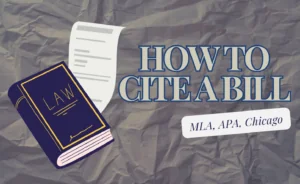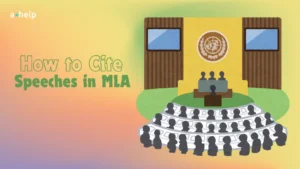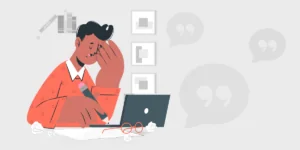Wikipedia, often the first stop for students diving into the depths of research, presents a unique challenge when it comes to citations. While it’s a treasure trove of background information, its reliability as a source for academic writing is rather debatable. This doesn’t mean it’s off-limits, though. We believe that with the right approach and a citation generator, citing Wikipedia across various styles can be straightforward, making your research be both comprehensive and credible.

✅ AI Essay Writer ✅ AI Detector ✅ Plagchecker ✅ Paraphraser
✅ Summarizer ✅ Citation Generator
Recognizing Wikipedia’s potential yet contentious role in research, you have to understand how to cite it properly if permitted by your institution or publication guidelines. Such citations should usually include the article’s title, the platform name (“Wikipedia” or “Wikimedia Foundation”), the date of the article’s last update, and the URL. The exact refrencing format varies with the formatting style—APA, MLA, or Chicago—each with its own set of rules.
How to cite Wikipedia in APA Style
APA style focuses on clarity and conciseness, recommending the use of archived versions of Wikipedia pages to ensure readers access the same content as the author.
📘 Key Points:
- 🔹 Use sentence case for the article title, capitalizing only the first word and proper nouns.
- 🔹 Include the exact date of the last revision you accessed.
- 🔹 Always link to the specific archived version of the Wikipedia article.
| ❌Wrong Citation | ✅ Right Citation |
|---|---|
| Wikipedia. Statistical Hypothesis Testing. Retrieved May 28, 2022, from https://en.wikipedia.org/wiki/Statistical_hypothesis_testing | Statistical hypothesis testing. (2022, May 28). In Wikipedia. https://en.wikipedia.org/w/index.php?title=Statistical_hypothesis_testing&oldid=1090223185 |
| Wikipedia article “Global Warming”. Accessed June 1, 2022. | Global warming. (2022, June 1). In Wikipedia. https://en.wikipedia.org/w/index.php?title=Global_warming&oldid=1100223185 |
| Wrong format for “Photosynthesis” article, no specific date. | Photosynthesis. (2022, April 15). In Wikipedia. https://en.wikipedia.org/w/index.php?title=Photosynthesis&oldid=1080223185 |
| Wikipedia page “Eiffel Tower” without archived URL. | Eiffel Tower. (2022, March 10). In Wikipedia. https://en.wikipedia.org/w/index.php?title=Eiffel_Tower&oldid=1070223185 |
| Incorrectly cited “Quantum Mechanics” page, generic URL. | Quantum mechanics. (2022, May 20). In Wikipedia. https://en.wikipedia.org/w/index.php?title=Quantum_mechanics&oldid=1095223185 |
How to cite Wikipedia in MLA Style
MLA style emphasizes the importance of the publisher and the date of the last modification, ensuring that citations are both informative and precise.
📚 Key Points:
- 🔹 Titles should be in headline capitalization.
- 🔹 Mention “Wikipedia, Wikimedia Foundation” as the publisher.
- 🔹 Include the date of the last modification at the end of your citation.
| ❌ Wrong Citation | ✅ Right Citation |
|---|---|
| Wikipedia page on Statistical Hypothesis Testing, accessed May 28, 2022. | “Statistical Hypothesis Testing.” Wikipedia, Wikimedia Foundation, 28 May 2022, https://en.wikipedia.org/w/index.php?title=Statistical_hypothesis_testing&oldid=1090223185. |
| “Global Warming” on Wikipedia without proper format. | “Global Warming.” Wikipedia, Wikimedia Foundation, 1 June 2022, https://en.wikipedia.org/w/index.php?title=Global_warming&oldid=1100223185. |
| Article “Photosynthesis” missing publisher info. | “Photosynthesis.” Wikipedia, Wikimedia Foundation, 15 April 2022, https://en.wikipedia.org/w/index.php?title=Photosynthesis&oldid=1080223185. |
| Eiffel Tower article cited without date. | “Eiffel Tower.” Wikipedia, Wikimedia Foundation, 10 March 2022, https://en.wikipedia.org/w/index.php?title=Eiffel_Tower&oldid=1070223185. |
| Quantum Mechanics, no date or publisher. | “Quantum Mechanics.” Wikipedia, Wikimedia Foundation, 20 May 2022, https://en.wikipedia.org/w/index.php?title=Quantum_mechanics&oldid=1095223185. |
How to cite Wikipedia in Chicago Style
Chicago style is unique in its approach to citing sources like Wikipedia, offering options for both footnote and author-date citations depending on the format used.
📖 Key Points:
- 🔹 For footnotes, include the article title, “Wikimedia Foundation,” and the last modified date.
- 🔹 Use the short note format for subsequent citations of the same article.
- 🔹 In-text citations should include the year and the title of the Wikipedia article.
- 🔹 Reference list entries should be detailed, including the title, “Wikimedia Foundation,” the last modification date, and the URL.
| ❌Wrong Citation | ✅ Right Citation |
|---|---|
| Wikipedia. Statistical Hypothesis Testing. May 28, 2022. | “Statistical Hypothesis Testing,” Wikimedia Foundation, last modified May 28, 2022, 05:52, https://en.wikipedia.org/wiki/Statistical_hypothesis_testing. |
| Global Warming Wikipedia page, no specific format. | “Global Warming,” Wikimedia Foundation, last modified June 1, 2022, 06:33, https://en.wikipedia.org/wiki/Global_warming. |
| Photosynthesis, cited without proper Chicago style. | “Photosynthesis,” Wikimedia Foundation, last modified April 15, 2022, 04:27, https://en.wikipedia.org/wiki/Photosynthesis. |
| Eiffel Tower article in generic citation format. | “Eiffel Tower,” Wikimedia Foundation, last modified March 10, 2022, 03:19, https://en.wikipedia.org/wiki/Eiffel_Tower. |
| Quantum Mechanics without modification date and time. | “Quantum Mechanics,” Wikimedia Foundation, last modified May 20, 2022, 05:45, https://en.wikipedia.org/wiki/Quantum_mechanic. |
Wrap Up
This guide should make citing Wikipedia sources in APA, MLA, and Chicago styles more straightforward and accurate. By following these examples and guidelines, you can build precise citations and stay consistent across their academic or research work.
FAQ
Follow us on Reddit for more insights and updates.





Comments (0)
Welcome to A*Help comments!
We’re all about debate and discussion at A*Help.
We value the diverse opinions of users, so you may find points of view that you don’t agree with. And that’s cool. However, there are certain things we’re not OK with: attempts to manipulate our data in any way, for example, or the posting of discriminative, offensive, hateful, or disparaging material.